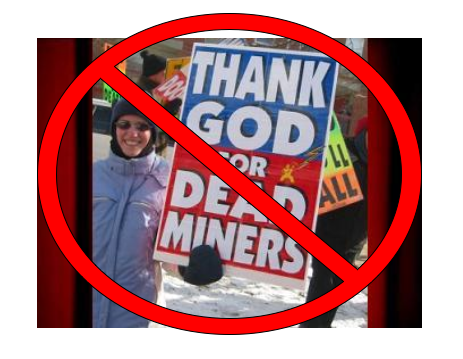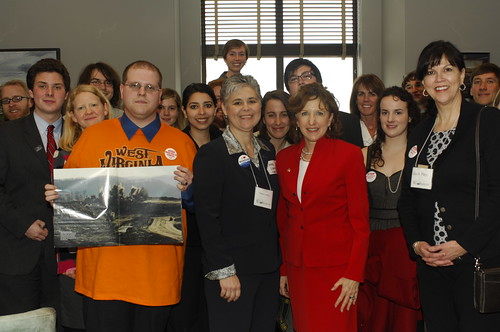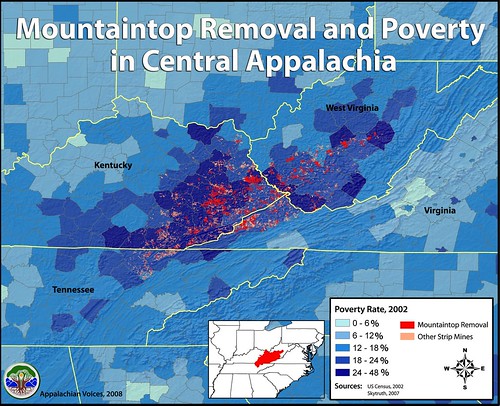Obama Administration Asked to Halt All New Mountaintop Removal Permits
– – – – – – – – – – –
CONTACTS:
Sandra Diaz, Director of Development and Communications, Appalachian Voices….828-262-1500
Dr. Matthew Wasson, Director of Programs, Appalachian Voices….828-262-1500
– – – – – – – – – – –
 Just days after the U.S. Environmental Protection Agency approved the expansion of the largest mountaintop removal coal mine in West Virginia, prominent national scientists published a blockbuster study which concludes that mountaintop removal’s impacts are “pervasive and irreversible.”
Just days after the U.S. Environmental Protection Agency approved the expansion of the largest mountaintop removal coal mine in West Virginia, prominent national scientists published a blockbuster study which concludes that mountaintop removal’s impacts are “pervasive and irreversible.”
Conducted by members of the National Academy of Sciences and published in the journal Science, the far-reaching study summarized dozens of pre-existing scientific papers analyzing the impacts of mountaintop removal mining, a type of surface coal mining that uses explosives to remove the tops of mountains to expose coal seams.
The study strongly criticized inadequate federal and state regulations on the practice, stating that “Current attempts to regulate [mountaintop mining/valley fill] practices are inadequate,” and that “Regulators should no longer ignore rigorous science.”
Environmental and Appalachian community advocates hailed the study as a powerful indictment against mountaintop removal mining. Opponents to the practice also expressed disappointment over the Obama Administration’s fluctuating stance on mountaintop removal, citing inconsistencies with statements made by President Obama about restoring science to a more prominent position in agency decision-making.
In a recent interview the President told the political news organization, Politico, “It’s about listening to what our scientists have to say, even when it’s inconvenient-especially when it’s inconvenient.”
Appalachian coalfield residents, who have long been aware of the major environmental impacts from mountaintop removal mining, are hopeful that the study will embolden the Obama Administration to take more decisive action to ultimately end the practice.
“The scientific study released today comes as little surprise to us living in the Central Appalachian coal mining region,” says Nina McCoy from Martin County, Ky., site of a large coal sludge dam break that overtook the county in 2000. “This should be the evidence the Obama Administration needs to close the floodgates on new mountaintop removal permits and stop the poisoning of our people.”
Last year, the Obama Administration released a multi-agency plan to more strictly enforce laws regulating mountaintop removal, but the President stopped short of prohibiting the practice.
On Thursday, the EPA told National Public Radio’s Diane Rehm Show that the agency does not have the authority to stop permitting mountaintop removal, however, critics believe there are other avenues through which the Administration could end the practice.
“The EPA has made commendable efforts to reduce the impacts of mountaintop removal on downstream water quality, but this study shows that mitigating and regulating the wholesale destruction of Appalachian Mountains is just not effective,” said Dr. Matthew Wasson, ecologist for the environmental non-profit group Appalachian Voices and director of the campaign to end mountaintop removal on iLoveMountains.org.
“The President has the power to end mountaintop removal through any number of agency actions,” Wasson added, “and he should call on Congress to pass the Clean Water Protection Act, a bill designed to end mountaintop removal-but the message from this study is that he’s out of excuses for allowing mountaintop removal to continue.”
###
Images and b-roll video available upon request. Please contact Jamie Goodman at jamie@appvoices.org or 828-262-1500
Update: See other reactions at NRDC, Grist, NY Times, Coal Tattoo, Washington Post, and McClatchy.




 No one except the crazy, misguided people at
No one except the crazy, misguided people at 
 Last week, the Alliance for Appalachia (including App Voices) put on our largest lobby week ever to end mountaintop removal. More than 200 participants from 27 states came to tell Congress to end mountaintop removal and pass the Clean Water Protection Act (HR 1310) and the Appalachia Restoration Act (S 696). Citizens directly impacted by mountaintop removal were joined by concerned Americans from as far away as Oregon, Maine, California, Minnesota, Michigan, and Colorado in an incredibly powerful act of solidarity. You can read more about their adventures in
Last week, the Alliance for Appalachia (including App Voices) put on our largest lobby week ever to end mountaintop removal. More than 200 participants from 27 states came to tell Congress to end mountaintop removal and pass the Clean Water Protection Act (HR 1310) and the Appalachia Restoration Act (S 696). Citizens directly impacted by mountaintop removal were joined by concerned Americans from as far away as Oregon, Maine, California, Minnesota, Michigan, and Colorado in an incredibly powerful act of solidarity. You can read more about their adventures in  Participants set up and executed over 150 meetings with Congressional offices, sharing their stories and concerns about the horrific practice of mountaintop removal. We also dropped in on over 200 additional offices with whom meetings were not scheduled, and worked hard to get face-to-face time with key Congressional targets.
Participants set up and executed over 150 meetings with Congressional offices, sharing their stories and concerns about the horrific practice of mountaintop removal. We also dropped in on over 200 additional offices with whom meetings were not scheduled, and worked hard to get face-to-face time with key Congressional targets.





 Just days after the U.S. Environmental Protection Agency approved the expansion of the largest mountaintop removal coal mine in West Virginia, prominent national scientists published a blockbuster study which concludes that mountaintop removal’s impacts are “pervasive and irreversible.”
Just days after the U.S. Environmental Protection Agency approved the expansion of the largest mountaintop removal coal mine in West Virginia, prominent national scientists published a blockbuster study which concludes that mountaintop removal’s impacts are “pervasive and irreversible.”